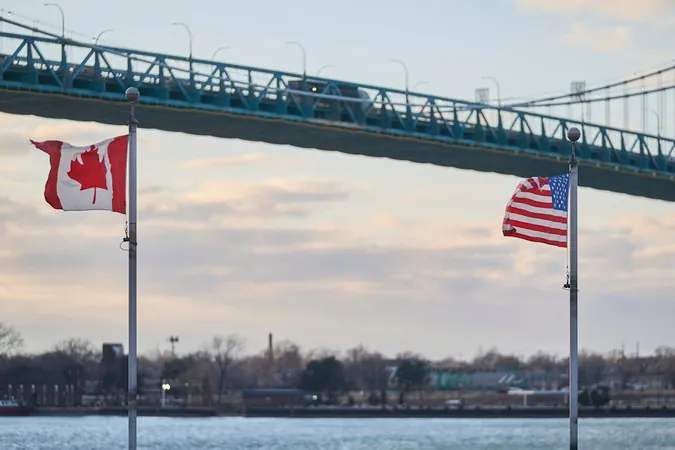
Canada's Bold Response to U.S. Vehicle Tariffs: What You Need to Know!
2025-04-08
Author: Jacob
Introduction
In a significant escalation of the ongoing trade tensions, Canada's government is set to implement counter-tariffs on U.S.-made vehicles starting April 9 at 12:01 a.m. This response follows U.S. President Donald Trump's recent decision to impose a hefty 25% tariff on vehicles manufactured outside the United States, stirring concerns across the automotive industry.
Canada's Government Response
Canadian Finance Minister Francois-Philippe Champagne emphasized Canada's commitment to countering these 'unwarranted and unreasonable tariffs.' In an official statement, he declared, 'Canada continues to respond forcefully to all unwarranted tariffs imposed by the U.S. on Canadian products. Our goal is clear: to protect Canadian workers, businesses, and our economy.'
The Growing Trade War
The trade war is heating up as Trump's tariffs, announced in early April, target all foreign-made cars and light trucks. This has prompted Prime Minister Mark Carney, who is simultaneously on the election campaign trail, to assert Canada’s own 25% tariffs on U.S. vehicles as a countermeasure.
Political Reactions and Proposals
Both Conservative leader Pierre Poilievre and NDP leader Jagmeet Singh have framed issues related to the tariffs as election priorities, pledging support for workers in the automotive sector. Poilievre has proposed a $3 billion fund aimed at lending assistance to affected businesses and exempting new Canadian-made cars from GST to stimulate local sales. Meanwhile, Singh’s party seeks to bolster Employment Insurance and reinvest tariff revenues into supporting impacted workers.
Details of the Tariffs
Under the newly instituted tariffs, any fully-assembled vehicle that does not comply with the Canada-U.S.-Mexico Agreement (CUSMA) will be subjected to these significant duties. Additionally, vehicles deemed CUSMA-compliant but containing non-Canadian and non-Mexican content will face the same punitive 25% tax.
Support for Domestic Production
What's more, the Canadian government is looking at implementing a remission framework designed to encourage auto manufacturers to boost production and investments domestically, potentially safeguarding Canadian jobs amid the storm. A detailed announcement regarding this framework is expected to be released soon.
Funding Auto Worker Support
In a bid to reassure the Canadian workforce, the Prime Minister’s Office has highlighted that all revenues generated from these tariffs are intended to directly fund support for auto workers affected by the trade spat.
Existing Tariffs and Consumer Impact
The Canadian auto industry isn't facing this battle alone; they’re already grappling with existing 25% tariffs on critical raw materials like steel and aluminum. Canadian consumers, too, have felt the sting of U.S. tariffs that were thrust upon all Canadian goods in March.
Future Relations with the U.S.
Trump's recent tariff announcements did not include Canada in his so-called 'reciprocal tariffs,' creating ambiguity about potential retaliatory measures from the U.S. However, there are murmurs that if these tariffs are lifted, Canada could potentially face its own version of a 'reciprocal' tariff.
Conclusion
As negotiations continue, the focus remains on protecting Canadian industries and workers, highlighting the broader implications of this unfolding trade drama. Keep your eyes peeled—this story is far from over!









 Brasil (PT)
Brasil (PT)
 Canada (EN)
Canada (EN)
 Chile (ES)
Chile (ES)
 Česko (CS)
Česko (CS)
 대한민국 (KO)
대한민국 (KO)
 España (ES)
España (ES)
 France (FR)
France (FR)
 Hong Kong (EN)
Hong Kong (EN)
 Italia (IT)
Italia (IT)
 日本 (JA)
日本 (JA)
 Magyarország (HU)
Magyarország (HU)
 Norge (NO)
Norge (NO)
 Polska (PL)
Polska (PL)
 Schweiz (DE)
Schweiz (DE)
 Singapore (EN)
Singapore (EN)
 Sverige (SV)
Sverige (SV)
 Suomi (FI)
Suomi (FI)
 Türkiye (TR)
Türkiye (TR)
 الإمارات العربية المتحدة (AR)
الإمارات العربية المتحدة (AR)